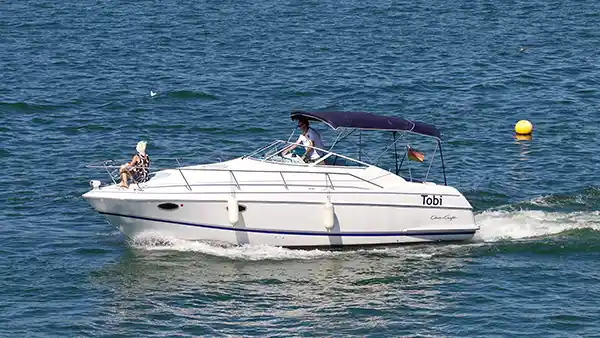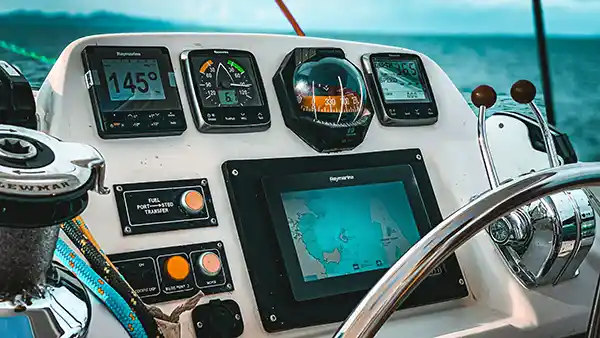Boat rental has become a very popular solution for experiencing the joys of boating or sailing, but without the constraints linked to owning a vessel. Whether you’re an experienced sailor or a beginner eager to set sail, chartering provides flexibility and a variety of options to suit your needs and budget.
First, let’s take a look at how chartering can be either more or less attractive than buying your own boat. Then we’ll look at the different ways of hiring a boat, the conditions to be met, and the client’s obligations. Finally, we’ll give you a few tips for a successful experience.
Benefits and drawbacks of chartering
Boat rental took off in the 1970s, spurred on by companies such as The Moorings and Sunsail. They came up with an alternative model to buying a boat. Let’s take a look at the pros and cons of this approach.
Advantages of chartering
Flexibility: You can choose the rental period and type of boat to suit your needs: a few hours, a day, a week…
Lower cost: Renting avoids the major financial investment and maintenance costs associated with boat ownership.
Diversity: You can try out different types of boats.
No long-term commitment: You’re not bound by a purchase contract, co-ownership or club membership.

Disadvantages of chartering :
Limited availability: Boats may already be booked, especially during the peak season.
Restrictions on use: Some restrictions may apply, depending on the type of boat and on charter conditions.
Recurring rental costs: Charter costs can add up if you rent frequently.
Less freedom compared to ownership: You must abide by the rules and conditions imposed by the owner or rental company: off-limits areas, prohibited activities, etc.
Handover and return of keys: This is a stressful and tedious phase that renters would prefer to avoid, but which is nevertheless a compulsory part of renting.
The different ways of hiring a boat
The offering has vastly expanded. Boats are now available for charter on most waterways and in virtually all cruising areas. Yet there are many different ways to hire a boat.
Renting from a professional
You can arrange to rent a boat from a boat rental or charter company. These companies generally offer a wide choice of boats and technical assistance if required. Some operators even specialise in the rental of electric boats.
Collaborative boating
Hiring out to a private individual is another option. Online platforms put boat owners in touch with people wishing to rent. This can be a more economical solution, but it’s important to check the proposed rental conditions and insurance.
The different types of rental
Rentals can last for a few hours, a day, a week or even a month, depending on your needs and budget.
Renting or hiring are the terms used mostly for a short-term arrangement, while chartering is preferred when talking about a multi-day experience. In this article, we cover both situations and may therefore use each term interchangeably.
In addition to hiring the boat itself (bareboat), you can also choose to charter a fully crewed boat. This enables you to delegate the operation of the boat to a professional skipper. Either the rental agency can propose a global package or you can hire the skipper separately.
Some companies offer rentals by the cabin (as opposed to the entire boat). It’s an ideal solution for those wishing to share the sailing experience with other travellers.
Finally, you can also enroll in a cruising school that will provide you with boat and skipper. In this type experience, instead of being a passive passenger you become an active crew member in training.

Conditions for renting a boat
There are usually several conditions involved in hiring a boat.
Boating license
Most countries require some form of license to captain a boat. While in some jurisdictions this may not be the case regarding sailboats, it is mostly the case for powerboats – except perhaps the smallest low-powered units.
If you’re planning to sail abroad, however, you’ll often be asked for a license, even if it’s not compulsory in your home waters. We therefore advise you to obtain whatever permit or license exists. It’s also good practice because you will be more familiar manoeuvring a vessel and with maritime regulations.
Insurance and security deposit
Liability insurance is generally compulsory. It is often included in the rental package when you hire from a company. If you’re renting from an individual, you may have to take out your own. A deposit is also required by the owner or charter company, and a deductible waiver, often only partial, may be offered at additional cost.
Cancellation conditions
Make sure you are aware of the cancellation conditions in the event of unforeseen circumstances or a change of dates. Don’t forget to take out cancellation insurance if there is any possibility of you being forced to cancel.

Renter’s obligations
As a renter, you must meet certain conditions, but you also have obligations when you want to charter a boat:
Taking care of the boat
Firstly, you are responsible for keeping the boat in good condition during the rental period. You must return your boat in the same condition it was handed over to you.
Respect safety rules
To ensure the safety of everyone on board, it is imperative that you abide by the navigation rules and the owner’s instructions. Certain waters or anchorages, for example, may be off-limits because they are deemed too risky for charter boats.
Advise the owner of any problem or incident
In the event of a technical problem or damage, you must inform the owner or rental company as soon as possible, so that they can work out a suitable solution.
A guide to planning a successful charter
To get the most out of your yacht charter, start by choosing the right type of boat for your needs and experience. To do this, take several factors into account:
Size: Depending on the number of people on board, the amount of space you want and your experience, choose the right boat. A small sailboat is ideal for a couples’ outing, while a catamaran is ideal for a family cruise. Make sure the boat has enough berths and a comfortable living area.
Manoeuvrability: If you’re a beginner, choose a boat that’s easy to handle and modest in size. Experienced sailors can opt for more powerful and technical boats.
Selecting the right crew companions: The success of your sailing trip also depends on the people on board. Choose crew members with complementary skills in navigation, manoeuvres or boat maintenance. Make sure that everyone is comfortable with the responsibilities assigned to them.
Communication is your best friend. Discuss your expectations in terms of activities, the pace of life on board and the sharing of tasks to avoid misunderstandings. This will foster a good atmosphere and a team spirit that will enable you to make the most of your time at sea.
Compare offers and prices from different rental sources: To find the best option, take the time to compare offers online and contact professionals and private individuals directly. You can check customer reviews and ratings to get an idea of the quality of the services included and the condition of the boat on offer.
Check the rental conditions and your obligations as a charterer: Before signing the rental contract, carefully read the conditions and make sure you understand your responsibilities. Take note of the booking, payment, deposit and insurance conditions. Also find out about navigation rules, restrictions on use and prohibited areas.
Find out about procedures in the event of an incident, breakdown or accident. Finally, make sure that the conditions for returning the boat are clear and fair.

The keys to a successful rental once you’re there
Equipment: Check that safety, navigation and leisure equipment (dinghy, fishing gear, etc.) are on board for the best possible sailing experience.
Inventory: This is a very important point to avoid unpleasant surprises. Carry out a full inventory of the boat before and after your charter. When you collect the boat, take a close look at its general condition, the state of the hull, sails, engine and safety equipment.
Cabin inspection: Once on board, inspect the heads (toilets) and other living quarters to check that everything is clean and in good working order.
Take detailed photos of all parts of the boat to document its initial condition and make it easier to compare when you return it. You can also test the navigation and communication equipment to make sure it’s working properly.
Check that all the necessary documents are supplied and valid. These obviously include the boat’s registration documents, equipment manuals and nautical charts. In some countries, you must also be provided with the owner’s checklist for the skipper. As a rule of thumb, even if it’s not mandatory, it’s a proof that the charter agency is serious about providing the crew with the important information.
You are strongly advised to repeat these checks when you return the boat to avoid any litigation with the owner or charter company. In the event of damage, report it immediately and provide photographic evidence. This will make it easier to settle any dispute.

Summing up
Boat hire has become a real industry with a very wide range on offer. It now presents an attractive alternative to buying a boat or joining a club. You can enjoy the pleasures of boating without the financial constraints and long-term responsibilities of owning a boat.
By choosing the right type of boat, comparing offers and complying with the rental conditions, you can enjoy a successful sailing experience tailored to your needs.
